Legendary American comedian, actor and director Jerry Lewis (1926-2017) scored in just about every branch of show business: nightclubs, radio, television, concerts, films and records. Lewis rose to fame in a comedy duo with Dean Martin, and his slapstick humour carried him through decades of film, television, stage and radio shows. Jerry was most popular in Europe, especially in France.
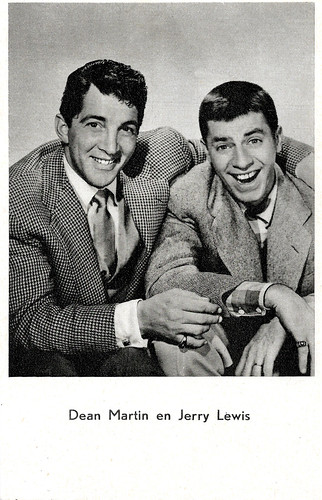
Dutch card. Dean Martin and Jerry Lewis.

French postcard by Editions P.I., Paris, offered by Les Carbones Korès Carboplane, no. 2 12 G. Photo: Paramount Pictures, 1958.
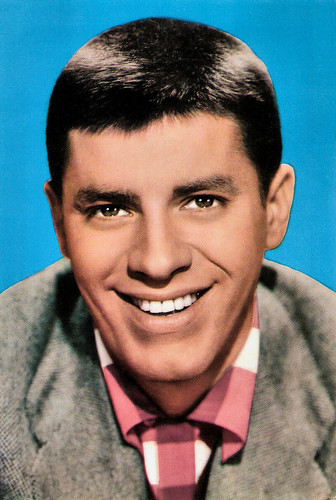
Spanish postcard by Archivo Bermejo, no. C. 238, 1964. Photo; Paramount Films. Publicity still for Who's Minding the Store? (Frank Tashlin, 1963).
Jerry Lewis was born Joseph Levitch in 1926, in Newark, New Jersey. He grew up performing in a vaudeville family. His father, Daniel Levitch, who went by the stage name Danny Lewis, was a master of ceremonies and vaudeville entertainer. His mother, Rae Lewis, played piano for the New York City radio station WOR and was her husband's musical director.
Lewis began following in his parents' footsteps, making his debut at the age of 5, singing Brother, Can You Spare a Dime? at 'Borscht Belt' nightclubs in the Catskill Mountains in New York. At the age of 15, Jerry Lewis dropped out of school to pursue a full-time career as a performer. He devised a comedy routine known as the Record Act in which he mimed and mouthed the lyrics to operatic and popular songs while a phonograph played the songs offstage.
Lewis worked as a theatre usher and soda jerk to make ends meet. He grew depressed and was on the verge of giving up on his show-business dreams when a friend of his father's, the comedian Max Coleman, convinced him to give comedy another shot. Lewis soon caught the attention of another comedian, Irving Kaye, who became the young comic's manager and helped his career along through more Borscht Belt appearances.
In 1946, singer Dean Martin joined Lewis as a performer at the 500 Club, and one of the greatest partnerships in the history of American show business was born. Their zany act began with Martin singing a song only to be interrupted by Lewis, with the routine soon devolving into a hilarious improvised sequence that included ad-libbed insults, food fights and frequent banter with the audience.
Billed as Martin and Lewis, the duo became such an instantaneous success that in a matter of months they went from earning $250 a week to a whopping $5,000. They made a successful transition to the big screen with My Friend Irma (George Marshall, 1949), based on the popular radio series of the same name. This was followed by the sequel My Friend Irma Goes West (Hal Walker, 1950).

Spanish postcard by Productos Compactos, S.A., no. 3768, 1991. Jerry Lewis and Jill St. John in Who's Minding the Store (Frank Tashlin, 1963).
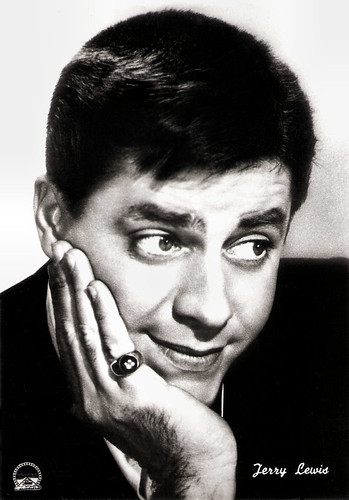
Italian postcard by Bromophoto, Milano, no. 1501. Photo: Paramount Films.
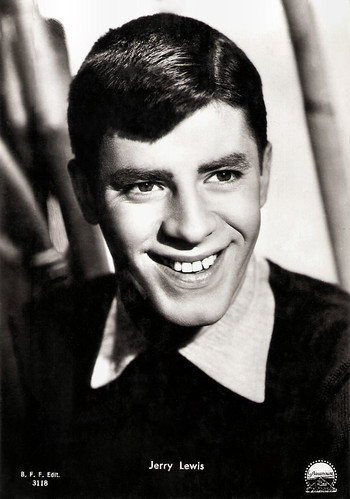
Italian postcard by Casa Editr. Balerini & Fratini, Firenze (Florence), no. 3119. Photo: Paramount Films.
Over the next decade, Dean Martin and Jerry Lewis made 16 films together, including The Stooge (Norman Taurog, 1952), The Caddy (Norman Taurog, 1952), Artists and Models (Frank Tashlin, 1955), co-starring Shirley MacLaine and Dorothy Malone, and finally Hollywood or Bust (Frank Tashlin, 1956) with Anita Ekberg.
The pair also made frequent television appearances on The Ed Sullivan Show and The Colgate Comedy Hour. However, by the mid-1950s their partnership and friendship began to fray as Lewis received greater national attention and, as he admitted later, drove Martin away with his egotism and insensitivity. The two split ways, both professionally and personally, in 1956.
Teaming with director Frank Tashlin, whose background as a Warner Bros. Looney Tunes cartoon director suited Lewis's brand of humour, he starred in five more films, The Sad Sack (George Marshall, 1957), Rock-A-Bye Baby (Frank Tashlin, 1958), The Geisha Boy (Frank Tashlin, 1958), Don't Give Up The Ship (Norman Taurog, 1959) and even appeared uncredited as Itchy McRabbitt in Li'l Abner (Melvin Frank, 1959).
Lewis also enjoyed solo success with films like The Delicate Delinquent (Don McGuire, 1957) with Martha Hyer, The Ladies Man (Jerry Lewis, 1961) and The Nutty Professor (Jerry Lewis, 1963) with Stella Stevens. He made his directorial debut with the comedy The Bellboy (Jerry Lewis, 1960). The film marked the pioneering use of a video assist system, providing Lewis a way to see the action even though he was in the scene.
Later Lewis's films were Who's Minding the Store? (Frank Tashlin, 1963), The Patsy (Jerry Lewis, 1964) and The Disorderly Orderly (Frank Tashlin, 1964). Lewis directed and co-wrote The Family Jewels (1965) about a young heiress who must choose among six uncles, one of whom is up to no good and out to harm the girl's beloved bodyguard who practically raised her. Lewis played all six uncles and the bodyguard. Lewis would also appear opposite Tony Curtis and Dany Saval in Boeing Boeing (John Rich, 1965).
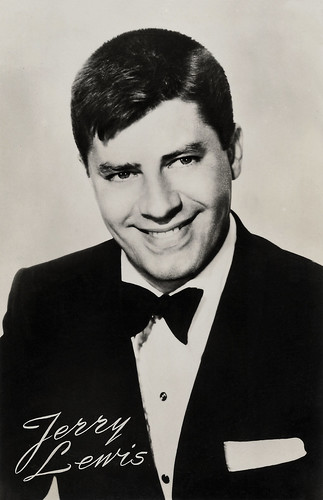
Dutch postcard by Uitg. Takken, Utrecht, no. AX 3710. Sent by mail in 1960.
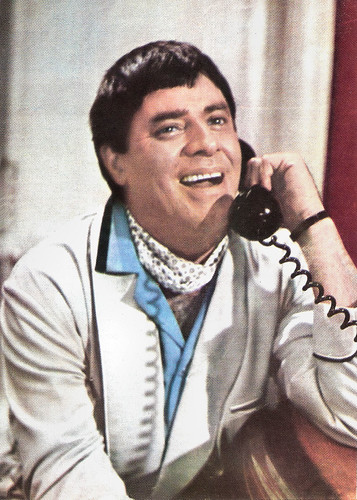
Romanian postcard by Casa Filmului Acin.

Italian postcard, no. 579.
In 1967 Jerry Lewis began teaching graduate film courses at the University of Southern California. His lectures were collected into a book, 'The Total Film-Maker' (1971), which is considered a seminal text in the industry. In England, he made Don't Raise the Bridge, Lower the River (Jerry Paris, 1968) with Terry-Thomas.
His career hit a rough patch in the 1970s, though he remained highly popular in Europe, especially in France. In Sweden, he filmed the drama The Day the Clown Cried (Jerry Lewis, 1972), about a German clown who was arrested by the Gestapo, interred in a concentration camp, and used to march Jewish children into the ovens. Reportedly, the film has been tied up in litigation and was never finished. Rough footage exists but a completed version never materialised.
After an absence of a decade, Jerry Lewis returned to the cinema in Hardly Working (Jerry Lewis, 1981), a film in which he both directed and starred. He played an unemployed circus clown who can't seem to hold down a job. The film opens with a brief montage of clips from past Lewis films. Despite being panned by critics, Hardly Working eventually earned $50 million.Lewis followed this with an acclaimed performance in The King of Comedy (Martin Scorsese, 1982). He portrayed a late-night talk-show host who craves his own privacy but is plagued by two obsessive fans, played by Robert De Niro and Sandra Bernhard. Anthony Piggott at IMDb: "Jerry Lewis is perfect as the disgruntled TV host. A man who lives a double life of a hilarious TV personality, with a bitter persona off-screen. You can certainly relate to this man's motivations, his love for his work, but his resistance to allow it run his personal life."
In 1995, Jerry Lewis fulfilled his lifelong dream of acting on Broadway, as the devil in a revival of 'Damn Yankees'. He got good reviews. Lewis was also active in the fight against muscular dystrophy, hosting the annual telethon for the Muscular Dystrophy Association from 1966 to 2010. For his efforts, Lewis was nominated for the Nobel Peace Prize in 1977. Lewis married Patti Palmer in 1944, and they had six sons together before she filed for divorce in 1980. In 1983, Lewis married SanDee Pitnick, and they adopted a daughter together. Gary Lewis, Jerry Lewis's oldest son, also pursued a show business career as the frontman for the band Gary Lewis and the Playboys. The band had a string of Top 10 hits in the mid-1960s. In 2009, tragedy struck when Joseph Lewis, the youngest of the six children from his first marriage who struggled with drug addiction, committed suicide at age 45.
During his career, he won several awards for lifetime achievements from The American Comedy Awards, the Los Angeles Film Critics Association, and the Venice Film Festival. In 2009, the Academy of Motion Picture Arts and Sciences awarded Lewis the Jean Hersholt Humanitarian Award. Jerry Lewis died at his home in Las Vegas in 2017, at the age of 91. His final film role was as the father of Nicolas Cage in the thriller The Trust (Alex Brewer, Benjamin Brewer, 2016).
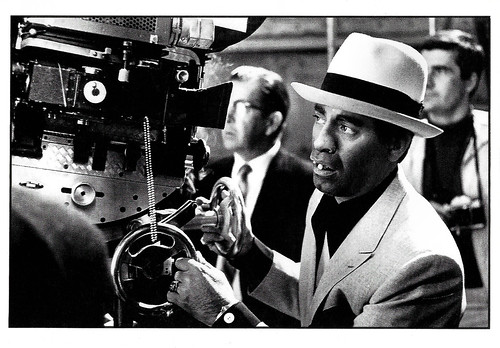
French postcard in the Entr'acte series by Éditions Asphodèle, Mâcon, no. 006/14. Photo: Collection B. Courtel / D.R. Jerry Lewis on the set of The Family Jewels (Jerry Lewis, 1965). Caption: Jerry Lewis plays almost all the roles in this film: here he is behind the camera with the outfit playing Bugs the gangster.
Trailer The Nutty Professor (1963). Source: dcaligari (YouTube).
Trailer The King Of Comedy (1983). Source: ryy79 (YouTube).
Sources: Biography.com, Wikipedia and IMDb.
This post was last updated on 20 March 2025.

Dutch card. Dean Martin and Jerry Lewis.

French postcard by Editions P.I., Paris, offered by Les Carbones Korès Carboplane, no. 2 12 G. Photo: Paramount Pictures, 1958.

Spanish postcard by Archivo Bermejo, no. C. 238, 1964. Photo; Paramount Films. Publicity still for Who's Minding the Store? (Frank Tashlin, 1963).
One of the greatest partnerships in the history of American show business
Jerry Lewis was born Joseph Levitch in 1926, in Newark, New Jersey. He grew up performing in a vaudeville family. His father, Daniel Levitch, who went by the stage name Danny Lewis, was a master of ceremonies and vaudeville entertainer. His mother, Rae Lewis, played piano for the New York City radio station WOR and was her husband's musical director.
Lewis began following in his parents' footsteps, making his debut at the age of 5, singing Brother, Can You Spare a Dime? at 'Borscht Belt' nightclubs in the Catskill Mountains in New York. At the age of 15, Jerry Lewis dropped out of school to pursue a full-time career as a performer. He devised a comedy routine known as the Record Act in which he mimed and mouthed the lyrics to operatic and popular songs while a phonograph played the songs offstage.
Lewis worked as a theatre usher and soda jerk to make ends meet. He grew depressed and was on the verge of giving up on his show-business dreams when a friend of his father's, the comedian Max Coleman, convinced him to give comedy another shot. Lewis soon caught the attention of another comedian, Irving Kaye, who became the young comic's manager and helped his career along through more Borscht Belt appearances.
In 1946, singer Dean Martin joined Lewis as a performer at the 500 Club, and one of the greatest partnerships in the history of American show business was born. Their zany act began with Martin singing a song only to be interrupted by Lewis, with the routine soon devolving into a hilarious improvised sequence that included ad-libbed insults, food fights and frequent banter with the audience.
Billed as Martin and Lewis, the duo became such an instantaneous success that in a matter of months they went from earning $250 a week to a whopping $5,000. They made a successful transition to the big screen with My Friend Irma (George Marshall, 1949), based on the popular radio series of the same name. This was followed by the sequel My Friend Irma Goes West (Hal Walker, 1950).

Spanish postcard by Productos Compactos, S.A., no. 3768, 1991. Jerry Lewis and Jill St. John in Who's Minding the Store (Frank Tashlin, 1963).

Italian postcard by Bromophoto, Milano, no. 1501. Photo: Paramount Films.

Italian postcard by Casa Editr. Balerini & Fratini, Firenze (Florence), no. 3119. Photo: Paramount Films.
Egotism and insensitivity
Over the next decade, Dean Martin and Jerry Lewis made 16 films together, including The Stooge (Norman Taurog, 1952), The Caddy (Norman Taurog, 1952), Artists and Models (Frank Tashlin, 1955), co-starring Shirley MacLaine and Dorothy Malone, and finally Hollywood or Bust (Frank Tashlin, 1956) with Anita Ekberg.
The pair also made frequent television appearances on The Ed Sullivan Show and The Colgate Comedy Hour. However, by the mid-1950s their partnership and friendship began to fray as Lewis received greater national attention and, as he admitted later, drove Martin away with his egotism and insensitivity. The two split ways, both professionally and personally, in 1956.
Teaming with director Frank Tashlin, whose background as a Warner Bros. Looney Tunes cartoon director suited Lewis's brand of humour, he starred in five more films, The Sad Sack (George Marshall, 1957), Rock-A-Bye Baby (Frank Tashlin, 1958), The Geisha Boy (Frank Tashlin, 1958), Don't Give Up The Ship (Norman Taurog, 1959) and even appeared uncredited as Itchy McRabbitt in Li'l Abner (Melvin Frank, 1959).
Lewis also enjoyed solo success with films like The Delicate Delinquent (Don McGuire, 1957) with Martha Hyer, The Ladies Man (Jerry Lewis, 1961) and The Nutty Professor (Jerry Lewis, 1963) with Stella Stevens. He made his directorial debut with the comedy The Bellboy (Jerry Lewis, 1960). The film marked the pioneering use of a video assist system, providing Lewis a way to see the action even though he was in the scene.
Later Lewis's films were Who's Minding the Store? (Frank Tashlin, 1963), The Patsy (Jerry Lewis, 1964) and The Disorderly Orderly (Frank Tashlin, 1964). Lewis directed and co-wrote The Family Jewels (1965) about a young heiress who must choose among six uncles, one of whom is up to no good and out to harm the girl's beloved bodyguard who practically raised her. Lewis played all six uncles and the bodyguard. Lewis would also appear opposite Tony Curtis and Dany Saval in Boeing Boeing (John Rich, 1965).

Dutch postcard by Uitg. Takken, Utrecht, no. AX 3710. Sent by mail in 1960.

Romanian postcard by Casa Filmului Acin.

Italian postcard, no. 579.
The King of Comedy
In 1967 Jerry Lewis began teaching graduate film courses at the University of Southern California. His lectures were collected into a book, 'The Total Film-Maker' (1971), which is considered a seminal text in the industry. In England, he made Don't Raise the Bridge, Lower the River (Jerry Paris, 1968) with Terry-Thomas.
His career hit a rough patch in the 1970s, though he remained highly popular in Europe, especially in France. In Sweden, he filmed the drama The Day the Clown Cried (Jerry Lewis, 1972), about a German clown who was arrested by the Gestapo, interred in a concentration camp, and used to march Jewish children into the ovens. Reportedly, the film has been tied up in litigation and was never finished. Rough footage exists but a completed version never materialised.
After an absence of a decade, Jerry Lewis returned to the cinema in Hardly Working (Jerry Lewis, 1981), a film in which he both directed and starred. He played an unemployed circus clown who can't seem to hold down a job. The film opens with a brief montage of clips from past Lewis films. Despite being panned by critics, Hardly Working eventually earned $50 million.Lewis followed this with an acclaimed performance in The King of Comedy (Martin Scorsese, 1982). He portrayed a late-night talk-show host who craves his own privacy but is plagued by two obsessive fans, played by Robert De Niro and Sandra Bernhard. Anthony Piggott at IMDb: "Jerry Lewis is perfect as the disgruntled TV host. A man who lives a double life of a hilarious TV personality, with a bitter persona off-screen. You can certainly relate to this man's motivations, his love for his work, but his resistance to allow it run his personal life."
In 1995, Jerry Lewis fulfilled his lifelong dream of acting on Broadway, as the devil in a revival of 'Damn Yankees'. He got good reviews. Lewis was also active in the fight against muscular dystrophy, hosting the annual telethon for the Muscular Dystrophy Association from 1966 to 2010. For his efforts, Lewis was nominated for the Nobel Peace Prize in 1977. Lewis married Patti Palmer in 1944, and they had six sons together before she filed for divorce in 1980. In 1983, Lewis married SanDee Pitnick, and they adopted a daughter together. Gary Lewis, Jerry Lewis's oldest son, also pursued a show business career as the frontman for the band Gary Lewis and the Playboys. The band had a string of Top 10 hits in the mid-1960s. In 2009, tragedy struck when Joseph Lewis, the youngest of the six children from his first marriage who struggled with drug addiction, committed suicide at age 45.
During his career, he won several awards for lifetime achievements from The American Comedy Awards, the Los Angeles Film Critics Association, and the Venice Film Festival. In 2009, the Academy of Motion Picture Arts and Sciences awarded Lewis the Jean Hersholt Humanitarian Award. Jerry Lewis died at his home in Las Vegas in 2017, at the age of 91. His final film role was as the father of Nicolas Cage in the thriller The Trust (Alex Brewer, Benjamin Brewer, 2016).

French postcard in the Entr'acte series by Éditions Asphodèle, Mâcon, no. 006/14. Photo: Collection B. Courtel / D.R. Jerry Lewis on the set of The Family Jewels (Jerry Lewis, 1965). Caption: Jerry Lewis plays almost all the roles in this film: here he is behind the camera with the outfit playing Bugs the gangster.
Trailer The Nutty Professor (1963). Source: dcaligari (YouTube).
Trailer The King Of Comedy (1983). Source: ryy79 (YouTube).
Sources: Biography.com, Wikipedia and IMDb.
This post was last updated on 20 March 2025.
No comments:
Post a Comment